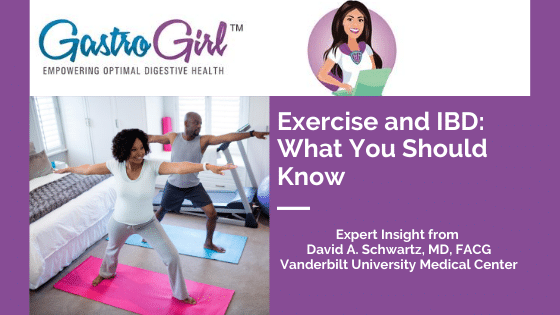Exercise and IBD: What You Should Know
If you have inflammatory bowel disease (IBD), which includes Crohn’s disease (CD) and ulcerative colitis (UC), you are likely willing to think outside the box to help manage your condition.
According to David A. Schwartz, MD, Gastroenterologist and Director of the Vanderbilt University Inflammatory Bowel Disease Center, around “50% of IBD patients seek alternative or complementary treatment for their CD.” Dr. Schwartz also tells us that “exercise is one of the more commonly utilized interventions.”3
Read on as Dr. Schwartz breaks down what you need to know about exercise and IBD.
Benefits of Exercise
Before we review the research on exercise and IBD, let’s take a step back and consider the general benefits of exercise on gastrointestinal (GI) conditions and the immune system.
 David A. Schwartz. MD, FACG
David A. Schwartz. MD, FACG Studies have found that “exercise has been associated with lower risks of a number of GI illnesses including chronic constipation, diverticular disease, and colorectal cancer,”9,11 says Dr. Schwartz.
Dr. Schwartz also tells us that studies have shown that exercise improves immune function.1 While this research was done on those without IBD, it is still of interest because of the role that the immune system plays in the disease.
In animal studies that used models of colitis, exercise was found to lower inflammatory signals and raise anti-inflammatory signals, explains Dr. Schwartz. While more research is needed, this could mean that exercise may help lower inflammation in those with IBD.
Do people with IBD exercise?
In order to experience the potential benefits of physical activity on your IBD, you need to be able to participate in exercise. If you do not currently exercise, you might be wondering how active other other people with IBD actually are.
Dr. Schwartz tells us that “overall, exercise rates in patients with IBD vary widely with most studies showing patients with CD have similar activity levels when compared to healthy controls.”5
However, not every study found the rates of exercise to be equal between those with and without IBD.
“One study did show slightly lower rates of moderately intense exercise compared to controls,”15 says Dr. Schwartz. This study found those who had active IBD and those who had the disease for longer were less active than those without IBD.
According to Dr. Schwartz, “many patients feel that factors such as abdominal or joint pain, fatigue, weakness, [and] fecal urgency limited their ability to exercise.”2 It’s important to work with your treatment team on these symptoms so you can stay active.
Exercise and IBD: finding a balance
When it comes to adding exercise into your IBD management plan, the key is finding the level of activity that gives you benefits without making your symptoms worse.
“Most patients feel exercise improves symptoms (72%) but it is important to not over do it as this may [lead to] an exacerbation of their IBD,”4,14 explains Dr. Schwartz. This means that some exercise is likely helpful for your IBD, but too much can be a problem.
Dr. Schwartz goes on to tell us that “disease related anemia may also play a role in limiting exercise capacity.” Therefore, it’s important to work with your healthcare team on addressing your anemia so it does not hold you back from being active.
If you are concerned about exercise leading to a flare, Dr. Schwartz provides some assurance. He says, “multiple studies have not demonstrated a significant risk of flaring with moderate exercise.”7,8,10,12
“In fact,” according to Dr. Schwartz, “there may be an inverse relationship between onset of CD and regular exercise, with a nearly 40% risk reduction for developing CD in those with at least moderate activity.”16 This means that those who exercised had a lower risk of developing Crohn’s disease.
For those who currently have IBD, “multiple studies show exercise leads to improved well-being, better [quality of life], and improved bone density,”2,13 explains Dr. Schwartz. He also tells us that a recent study on about 1,300 people with Crohn’s disease “showed a lower risk of relapse with a higher level of exercise.”6
Should I exercise for my IBD?
Dr. Schwartz has provided us with plenty of reasons why exercise may be helpful for those with IBD. He summarized his discussion of the research by saying, “low to moderate exercise is an important part of the treatment regime for patients with CD. It may help modulate disease activity and counteract some disease related complications.”
Dr. Schwartz reminds us that it’s essential to talk to your doctor before starting to exercise or making changes to your current exercise routine. Your doctor can help you determine what level of activity is right for you.
Remember that exercise for your IBD is a balancing act, but your doctor and treatment team can help you find your sweet spot.
Related Resources:
ACG Expert Tips on Living Well with IBD
ACG Patient Health Center: Inflammatory Bowel Disease
References
1. Brolinson, P. G. and D. Elliott (2007). “Exercise and the immune system.” Clin Sports Med 26(3): 311-9.
2. Chan, D., H. Robbins, et al. (2014). “Inflammatory bowel disease and exercise: results of a Crohn’s and Colitis UK survey.” Frontline Gastroenterol 5(1): 44-48.
3. Cheifetz, A. S., R. Gianotti, et al. (2017). “Complementary and Alternative Medicines Used by Patients With Inflammatory Bowel Diseases.” Gastroenterology 152(2): 415-429.e15.
4. DeFilippis, E. M., S. Tabani, et al. (2016). “Exercise and Self-Reported Limitations in Patients with Inflammatory Bowel Disease.” Dig Dis Sci 61(1): 215-20.
5. Engels, M., R. K. Cross, et al. (2018). “Exercise in patients with inflammatory bowel diseases: current perspectives.” Clin Exp Gastroenterol 11: 1-11.
6. Jones, P. D., M. D. Kappelman, et al. (2015). “Exercise decreases risk of future active disease in patients with inflammatory bowel disease in remission.” Inflamm Bowel Dis 21(5): 1063-71.
7. Klare, P., J. Nigg, et al. (2015). “The impact of a ten-week physical exercise program on health-related quality of life in patients with inflammatory bowel disease: a prospective randomized controlled trial.” Digestion 91(3): 239-47.
8. Loudon, C. P., V. Corroll, et al. (1999). “The effects of physical exercise on patients with Crohn’s disease.” Am J Gastroenterol 94(3): 697-703.
9. Martínez, M. E. (2005). “Primary prevention of colorectal cancer: lifestyle, nutrition, exercise.” Recent Results Cancer Res 166: 177-211.
10. Ng, V., W. Millard, et al. (2007). “Low-intensity exercise improves quality of life in patients with Crohn’s disease.” Clin J Sport Med 17(5): 384-8.
11. Peters, H. P., W. R. De Vries, et al. (2001). “Potential benefits and hazards of physical activity and exercise on the gastrointestinal tract.” Gut 48(3): 435-9.
12. Ploeger, H., J. Obeid, et al. (2012). “Exercise and inflammation in pediatric Crohn’s disease.” Int J Sports Med 33(8): 671-9.
13. Robinson, R. J., T. Krzywicki, et al. (1998). “Effect of a low-impact exercise program on bone mineral density in Crohn’s disease: a randomized controlled trial.” Gastroenterology 115(1): 36-41.
14. Tew, G. A., K. Jones, et al. (2016). “Physical Activity Habits, Limitations, and Predictors in People with Inflammatory Bowel Disease: A Large Cross-sectional Online Survey.” Inflamm Bowel Dis 22(12): 2933-2942.
15. Van Langenberg, D. R., M. C. Papandony, et al. (2015). “Sleep and physical activity measured by accelerometry in Crohn’s disease.” Aliment Pharmacol Ther 41(10): 991-1004.
16. Wang, Q., K. Q. Xu, et al. (2016). “Association between physical activity and inflammatory bowel disease risk: A meta-analysis.” Dig Liver Dis 48(12): 1425-1431.
Katelyn Collins, RD is a registered dietitian and health writer specializing in digestive health. Katelyn’s personal experience with a digestive condition first sparked her passion for nutrition and health. Since then, she has been a vocal advocate for the digestive health community and has dedicated her own nutrition practice to serving those with digestive conditions.
Author:
Listen to our
latest Podcast!









